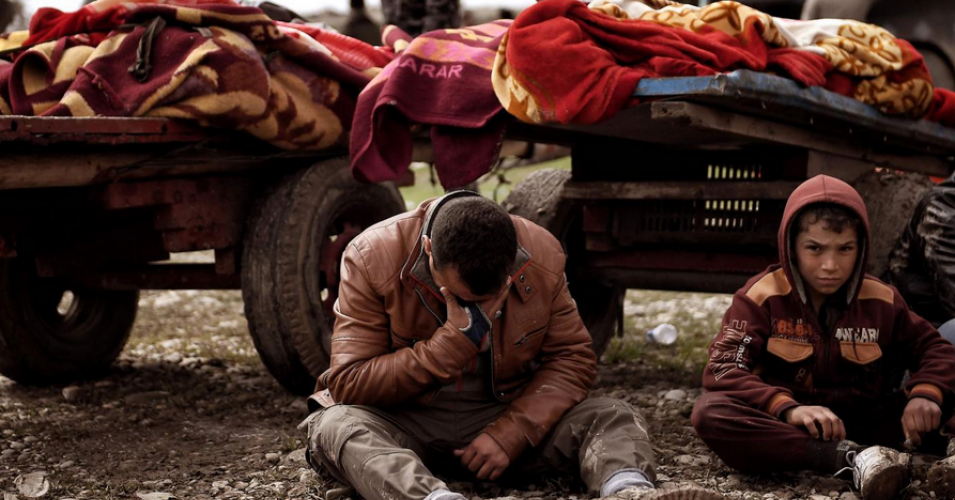 August 13, 2019 / William Astore / The Nation - When I was a teenager in the 1970s, I looked to the heavens: to God and Christianity (as arbitrated by the Catholic Church) and to the soaring warbirds of the US military, which I believed kept us safe. To my mind then, they were classic manifestations of American technological superiority over the godless communists.
August 13, 2019 / William Astore / The Nation - When I was a teenager in the 1970s, I looked to the heavens: to God and Christianity (as arbitrated by the Catholic Church) and to the soaring warbirds of the US military, which I believed kept us safe. To my mind then, they were classic manifestations of American technological superiority over the godless communists.
With all its scandals, especially when it came to priestly sexual abuse, I lost my faith in the Catholic Church. I would later learn that there had been a predatory priest in my parish when I was young, a grim man who made me uneasy at the time, though back then I couldn’t have told you why. As for those warbirds, like so many Americans, I thrilled to their roar at air shows but never gave any real thought to the bombs they were dropping in Vietnam and elsewhere, to the lives they were ending, to the destruction they were causing. Nor at that age did I ever consider their enormous cost in dollars or just how much Americans collectively sacrificed to have top cover, whether of the warplane or godly kind.
NNOMY
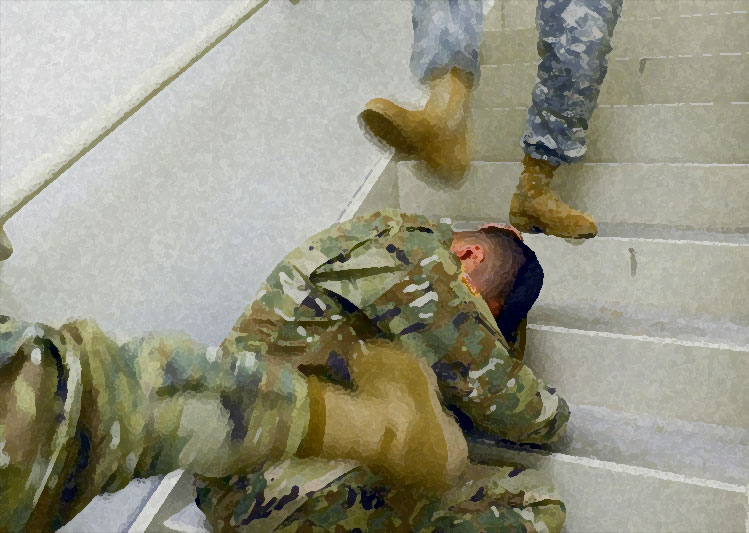 January 18 2021 / Gary Ghirardi / Op-ed / NNOMY - With the violence witnessed in the beginning of 2021 at the nation's capital, we have been forced to acknowledge the culture war that exists in the United States in full expression. We also witnessed in the subtext of that event, and the emerging crisis that will follow it, the government's promise of increasing securitization as a reaction to it. That process did not start at the "surge on the capital" but has been in a steady progression of growth for many years. This latest event only provides an additional justification for the need to increase the militarization of our "democracy."
January 18 2021 / Gary Ghirardi / Op-ed / NNOMY - With the violence witnessed in the beginning of 2021 at the nation's capital, we have been forced to acknowledge the culture war that exists in the United States in full expression. We also witnessed in the subtext of that event, and the emerging crisis that will follow it, the government's promise of increasing securitization as a reaction to it. That process did not start at the "surge on the capital" but has been in a steady progression of growth for many years. This latest event only provides an additional justification for the need to increase the militarization of our "democracy."
Nowhere is that trend more evident as in the Junior Reserves Officers Training Corps (JROTC) military cadet program slated for a massive expansion. What is billed by the Pentagon as a character building and good citizenship program designed to instill leadership qualities in young people, now is being funded to expand from 3500 nation-wide units to over 6000. JROTC corps are constructed increasingly of ethnic minority and black youth disadvantaged with a lack of opportunities to jump start their lives. This is not an organic development. Those poorer youth lacking in programs designed to prepare them for college are specifically profiled and targeted for JROTC programs. In Chicago that targeting has gone a step further in configuring actual public schools as military academies complete with military school uniforms, protocols and curriculum.
How the student loan debt crisis forces low-income students of color into the military.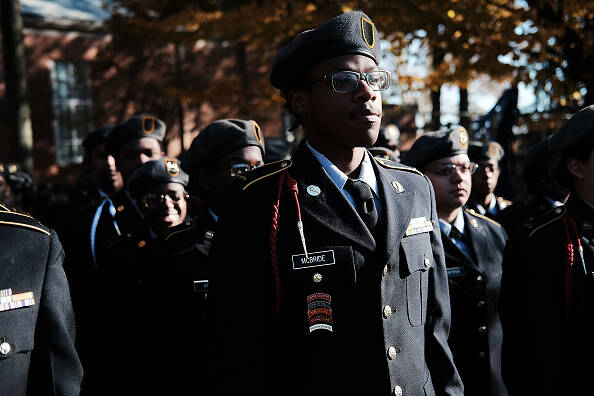 Anna Attie / In These Times - When James Gardner got injured playing basketball as a DePaul University freshman, he lost his financial aid package and was dropped from his classes. To stay in school, he took out a $10,000 loan.
Anna Attie / In These Times - When James Gardner got injured playing basketball as a DePaul University freshman, he lost his financial aid package and was dropped from his classes. To stay in school, he took out a $10,000 loan.
Soon, Gardner (a pseudonym requested in fear of reprisal) and his family realized they couldn’t afford the university. Instead, he transferred to a public university outside Chicago and enrolled in the Reserve Officer Training Corps (ROTC) of the Air Force. The military paid for his entire college education — on the condition he serve at least four years after graduation.
Gardner is a member of the Democratic Socialists of America (DSA) and says the military is geared toward “resource extraction and resource allocation.” When DSA colleagues learn about his military background, he says there is a “little bit of a gasp.”
“Would I be in the same predicament,” he wonders, “if college and university were tuition-free? Would I have gone through ROTC? I don’t know.”
Gardner’s situation isn’t unique. Americans owe more than $1.67 trillion in student debt (Source: adjusted for 11/2022 now $1.768 trillion) , and the cost of college has increased by more than 25% in the past 10 years. According to a 2017 poll by the Department of Defense, paying for education is the top reason young people consider enlisting. In 2019, the Army credited the student debt crisis with helping it surpass its recruitment goals.
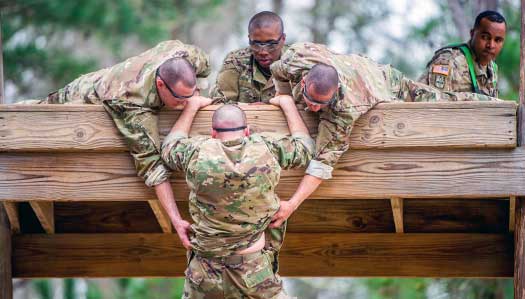 Fabiola Cardozo / NNOMY / español - Some elements make the popularity, frequency, and increased rate of the military enlistment of many young people possible. One of the most important is the influence they receive from their environment on the part of those people who act as counselors and teachers within the schools they attend, as well as from their parents or relatives at home. The normalization of militarization in American society leads us to think of military enlistment as a great option for young people’s futures. However, little is said about the real difficulties they will face. An adult who advises a teenager on military enlistment has naturalized war in a way that is not conducive to better decision-making on the part of young people, preventing the exploration of less violent alternatives. (See: http://peacefulcareers.org/index.html).
Fabiola Cardozo / NNOMY / español - Some elements make the popularity, frequency, and increased rate of the military enlistment of many young people possible. One of the most important is the influence they receive from their environment on the part of those people who act as counselors and teachers within the schools they attend, as well as from their parents or relatives at home. The normalization of militarization in American society leads us to think of military enlistment as a great option for young people’s futures. However, little is said about the real difficulties they will face. An adult who advises a teenager on military enlistment has naturalized war in a way that is not conducive to better decision-making on the part of young people, preventing the exploration of less violent alternatives. (See: http://peacefulcareers.org/index.html).
Within the school, some teachers and counselors receive encouragement from the Pentagon to influence and foster an interest in the military sector in young people. As we know, between students and teachers or counselors, there is an inherent power dynamic that gives educators almost unquestionable validity, leading to a dangerous influence. Likewise, the constant visits of military recruiters and the implementation of school programs that encourage entry into military service mean that young people are being permanently influenced by this idea. (See: https://nnomy.org/en/what-is-militarization/school-militarization.html).
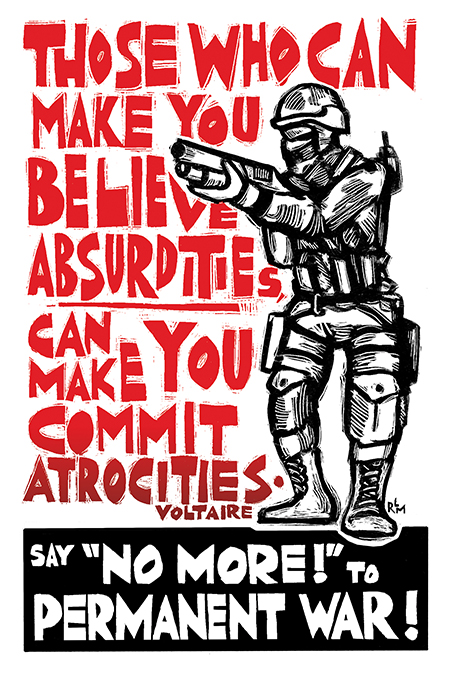 Fabiola Cardozo / NNOMY / español - The rhetoric about the need for a military draft in American society is lost sight of in history. The patriotic struggle to defend the nation from possible threats and the urgency to demobilize alleged terrorism attempts and take democracy to other latitudes, has served to implement policies that perpetuate permanent war and make invisible or undermine the possibility of more democratic and pacifist mechanisms in international relations.
Fabiola Cardozo / NNOMY / español - The rhetoric about the need for a military draft in American society is lost sight of in history. The patriotic struggle to defend the nation from possible threats and the urgency to demobilize alleged terrorism attempts and take democracy to other latitudes, has served to implement policies that perpetuate permanent war and make invisible or undermine the possibility of more democratic and pacifist mechanisms in international relations.
Such has been the recurrence of this rhetoric that American society sometimes does not question the actions leading to warfare caused by the government in power. As mentioned in this article:
Yet celebrating the military, nobilizing the military experience, finding purpose and meaning in continuous war, is the very definition of militarism.
A true democracy has a military as a reluctant and regrettable choice, driven by the need to defend itself in a hostile and violent world.
…We’ve become so accustomed to living with the drumbeats of war that we no longer hear them…We’re hearing them all the time today — it’s the background noise to our lives. For some, it’s even become sweet music. But war and militarism is never sweet music to a functioning democracy.
(See: https://bracingviews.com/2015/07/23/the-united-states-of-militarism/)
Despite the potential that the US has, and that could be developed more efficiently to provide greater social welfare to its inhabitants and the rest of the world through inventiveness and technological innovation, it is a country that has assumed militarism and that seeks to lead with exports of weapons in conflict scenarios on a planetary scale.
Subcategories
Opinion Article Count: 2
The NNOMY Opinion section is a new feature of our articles section. Writing on youth demilitarization issues is quite rare but we have discovered the beginning articles and notes being offered on this subject so we have decided to present them under an opinion category. The articles presented do not necessarily reflect the views of the NNOMY Steering Committee.
Globalization & Militarization Article Count: 1
Military Presence in Our Schools Article Count: 8
Art & Cultural Activism Article Count: 1
The Militarization of U.S. Culture Article Count: 23
 Though the United States of America shares with other nations in a history of modern state militarism, the past 65 years following its consolidation as a world military power after World War II, has seen a shift away from previous democratic characterizations of the state. The last thirty years, with the rise of the neo-conservative Reagan and Bush administrations (2), began the abandonment of moral justifications for democracy building replaced by bellicose proclamations of the need and right to move towards a national project of global security by preemptive military force .
Though the United States of America shares with other nations in a history of modern state militarism, the past 65 years following its consolidation as a world military power after World War II, has seen a shift away from previous democratic characterizations of the state. The last thirty years, with the rise of the neo-conservative Reagan and Bush administrations (2), began the abandonment of moral justifications for democracy building replaced by bellicose proclamations of the need and right to move towards a national project of global security by preemptive military force .
In the process of global military expansion, the US population has been subjected to an internal re-education to accept the role of the U.S. as consolidating its hegemonic rule internationally in the interest of liberal ideals of wealth creation and protectionism.
The average citizen has slowly come to terms with a stealthly increasing campaign of militarization domestically in media offerings; from television, movies and scripted news networks to reinforce the inevitability of a re-configured society as security state. The effect has begun a transformation of how, as citizens, we undertand our roles and viability as workers and families in relation to this security state. This new order has brought with it a shrinking public common and an increasing privatization of publicly held infrustructure; libraries, health clinics, schools and the expectation of diminished social benefits for the poor and middle-class. The national borders are being militarized as are our domestic police forces in the name of Homeland Security but largely in the interest of business. The rate and expansion of research and development for security industries and the government agencies that fund them, now represent the major growth sector of the U.S.economy. Additionally, as the U.S. economy continually shifts from productive capital to financial capital as the engine of growth for wealth creation and development, the corporate culture has seen its fortunes rise politically and its power over the public sector grow relatively unchallenged by a confused citizenry who are watching their social security and jobs diminishing.
How increasing cultural militarization effects our common future will likely manifest in increased public dissatisfaction with political leadership and economic strictures. Social movements within the peace community, like NNOMY, will need to expand their role of addressing the dangers of militarists predating youth for military recruitment in school to giving more visibility to the additional dangers of the role of an influential militarized media, violent entertainment and play offerings effecting our youth in formation and a general increase and influence of the military complex in all aspects of our lives. We are confronted with a demand for a greater awareness of the inter-relationships of militarism in the entire landscape of domestic U.S. society. Where once we could ignore the impacts of U.S. military adventurisms abroad, we are now faced with the transformation of our domestic comfort zone with the impacts of militarism in our day to day lives.
How this warning can be imparted in a meaningful way by a movement seeking to continue with the stated goals of counter-recruitment and public policy activism, and not loose itself in the process, will be the test for those activists, past and future, who take up the call to protect our youth from the cultural violence of militarism.
The "militarization of US culture" category will be an archive of editorials and articles about the increasing dangers we face as a people from those who are invested in the business of war. This page will serve as a resource for the NNOMY community of activists and the movement they represent moving into the future. The arguments presented in this archive will offer important realizations for those who are receptive to NNOMY's message of protecting our youth, and thus our entire society, of the abuses militarism plays upon our hopes for a sustainable and truly democratic society.
NNOMY
Resources Article Count: 2
The Resources section covers the following topics:
International Networking Article Count: 1
Book Reviews Article Count: 5
NNOMY Network News Article Count: 12
News reports from the groups associated to the NNOMY Network including Social Media.
CR Reports Article Count: 5
Reports from counter-recruitment groups and activists from the field. Includes information about action reports at recruiting centers and career fairs, school tabling, and actions in relation to school boards and state legislatures.
CR in the News Article Count: 8
David Swanson Article Count: 6
 David Swanson is the author of the new book, Daybreak: Undoing the Imperial Presidency and Forming a More Perfect Union, by Seven Stories Press and of the introduction to The 35 Articles of Impeachment and the Case for Prosecuting George W. Bush by Dennis Kucinich. In addition to cofounding AfterDowningStreet.org, he is the Washington director of Democrats.com and sits on the boards of a number of progressive organizations in Washington, DC.
David Swanson is the author of the new book, Daybreak: Undoing the Imperial Presidency and Forming a More Perfect Union, by Seven Stories Press and of the introduction to The 35 Articles of Impeachment and the Case for Prosecuting George W. Bush by Dennis Kucinich. In addition to cofounding AfterDowningStreet.org, he is the Washington director of Democrats.com and sits on the boards of a number of progressive organizations in Washington, DC.
Charlottesville Right Now: 11-10-11 David Swanson
David Swanson joins Coy to discuss Occupy Charlottesville, protesting Dick Cheney's visit to the University of Virginia, and his new book. - Listen
Jorge Mariscal Article Count: 2
 Jorge Mariscal is the grandson of Mexican immigrants and the son of a U.S. Marine who fought in World War II. He served in the U.S. Army in Vietnam and currently teaches at the University of California, San Diego.
Jorge Mariscal is the grandson of Mexican immigrants and the son of a U.S. Marine who fought in World War II. He served in the U.S. Army in Vietnam and currently teaches at the University of California, San Diego.
Matt Guynn Article Count: 1
 Matt Guynn plays the dual role of program director and coordinator for congregational organizing for On Earth Peace, building peace and nonviolence leadership within the 1000+ congregations of the Church of the Brethren across the United States and Puerto Rico. He previously served a co-coordinator of training for Christian Peacemaker Teams, serving as an unarmed accompanier with political refugees in Chiapas, Mexico, and offering or supporting trainings in the US and Mexico.
Matt Guynn plays the dual role of program director and coordinator for congregational organizing for On Earth Peace, building peace and nonviolence leadership within the 1000+ congregations of the Church of the Brethren across the United States and Puerto Rico. He previously served a co-coordinator of training for Christian Peacemaker Teams, serving as an unarmed accompanier with political refugees in Chiapas, Mexico, and offering or supporting trainings in the US and Mexico.
Rick Jahnkow Article Count: 8
 Rick Jahnkow works for two San Diego-based anti-militarist organizations, the Project on Youth and Non-Military Opportunities and the Committee Opposed to Militarism and the Draft. He can be reached at: This email address is being protected from spambots. You need JavaScript enabled to view it.
Rick Jahnkow works for two San Diego-based anti-militarist organizations, the Project on Youth and Non-Military Opportunities and the Committee Opposed to Militarism and the Draft. He can be reached at: This email address is being protected from spambots. You need JavaScript enabled to view it.
Pat Elder Article Count: 12
 Pat Elder was a co-founder of the DC Antiwar Network (DAWN) and a member of the Steering Committee of the National Network Opposing the Militarization of Youth, (NNOMY). Pat is currently involved in a national campaign with the Women's International League for Peace & Freedom project, Military Poisons, investigating on U.S. military base contamination domestically and internationally. Pat’s work has prominently appeared in NSA documents tracking domestic peace groups.
Pat Elder was a co-founder of the DC Antiwar Network (DAWN) and a member of the Steering Committee of the National Network Opposing the Militarization of Youth, (NNOMY). Pat is currently involved in a national campaign with the Women's International League for Peace & Freedom project, Military Poisons, investigating on U.S. military base contamination domestically and internationally. Pat’s work has prominently appeared in NSA documents tracking domestic peace groups.
All Documents:
Pat Elder - National Network Opposing the Militarization of Youth
COMMUNITY ACTION Article Count: 2
Network Actions Article Count: 5
EVENTS & CONFERENCES Article Count: 4
NNOMY periodically participates in or organizes events(e.i. conferences, rallies) with other organizations.
CR Activist Reports Article Count: 2
CR Discussion List Article Count: 1
NNOMY in the News Article Count: 13
National CR Database Article Count: 1
GI Resistance Article Count: 1
Conscientious Objection Article Count: 1
NNOMY National Conference Article Count: 11
Materials/Training Article Count: 1
For Educators/Guidance Counselors Article Count: 2
Recruiting on College Campuses Article Count: 1
Model Programs Article Count: 1
School Policies Article Count: 5
EN ESPAÑOL Article Count: 1
Equal access Article Count: 1
NCLB Article Count: 1
MILITARISM & WAR Article Count: 3
FOR ENLISTED PERSONNEL Article Count: 1
FOR PARENTS Article Count: 1
CONSIDERING ENLISTING? Article Count: 1
RECRUITING IN SPECIFIC COMMUNITIES Article Count: 1
MILITARY RECRUITING TOOLS & METHODS Article Count: 3
SCHOOL BASED COUNTER RECRUITMENT Article Count: 6
Know Your Rights Article Count: 2
Delayed Entry Program/DEP Article Count: 1
Alternatives by State Article Count: 1
NNOMY Article Count: 13
ALTERNATIVES TO THE MILITARY Article Count: 3
Facts & Figures Article Count: 1
COUNTER RECRUITING ESSENTIALS Article Count: 1
The Counter-recruitment Essentials section of the NNOMY web site covers the issues and actions spanning this type of activism. Bridging the difficult chasms between religious, veteran, educator, student, and community based activism is no small task. In this section you will find information on how to engage in CR activism in your school and community with the support of the knowledge of others who have been working to inform youth considering enlisting in the military. You will also find resources for those already in the military that are looking for some guidance on how to actively resist injustices as a soldier or how to choose a path as a conscientious objector.
Steering Committee Article Count: 1
Articles Article Count: 227
John Judge Article Count: 5
![]() John Judge was a co-founder of the Committee for High School Options and Information on Careers, Education and Self-Improvement (CHOICES) in Washington DC, an organization engaged since 1985 in countering military recruitment in DC area high schools and educating young people about their options with regard to the military. Beginning with the war in Viet Nam, Judge was a life-long anti-war activist and tireless supporter of active-duty soldiers and veterans.
John Judge was a co-founder of the Committee for High School Options and Information on Careers, Education and Self-Improvement (CHOICES) in Washington DC, an organization engaged since 1985 in countering military recruitment in DC area high schools and educating young people about their options with regard to the military. Beginning with the war in Viet Nam, Judge was a life-long anti-war activist and tireless supporter of active-duty soldiers and veterans.
"It is our view that military enlistment puts youth, especially African American youth, at special risk, not only for combat duty, injury and fatality, but for military discipline and less than honorable discharge, which can ruin their chances for employment once they get out. There are other options available to them."
In the 1970's the Selective Service System and the paper draft became unworkable, requiring four induction orders to get one report. Boards were under siege by anti-war and anti-draft forces, resistance of many kinds was rampant. The lottery system failed to dampen the dissent, since people who knew they were going to be drafted ahead of time became all the more active. Local draft board members quit in such numbers that even I was approached, as a knowledgeable draft counselor to join the board. I refused on the grounds that I could never vote anyone 1-A or eligible to go since I opposed conscription and the war.
At this point the Pentagon decided to replace the paper draft with a poverty draft, based on economic incentive and coercion. It has been working since then to draw in between 200-400,000 enlisted members annually. Soon after, they began to recruit larger numbers of women to "do the jobs men don't want to". Currently recruitment quotas are falling short, especially in Black communities, and reluctant parents are seen as part of the problem. The hidden problem is retention, since the military would have quadrupled by this time at that rate of enlistment, but the percentage who never finish their first time of enlistment drop out at a staggering rate.
I began bringing veterans of the Vietnam War into high schools in Dayton, Ohio in the late 1960s, and have continued since then to expose young people to the realities of military life, the recruiters' false claims and the risks in combat or out. I did it first through Vietnam Veterans Against the War/Winter Soldier Organization, then Dayton Draft & Military Counseling, and since 1985 in DC through C.H.O.I.C.E.S.
The key is to address the broader issues of militarization of the schools and privacy rights for students in community forums and at meetings of the school board and city council. Good counter-recruitment also provides alternatives in the civilian sector to help the poor and people of color, who are the first targets of the poverty draft, to find ways to break into the job market, go to a trade school, join an apprenticeship program, get job skills and placement help, and find money for college without enlisting in the military.
- War Opponents Train For Visits to Area Schools And Recruitment Centers, Michelle Boorstein, Washington Post
- Counter-Recruitment and the Campaign to Demilitarize Public Schools - Scott Harding, Seth Kershner
- C.H.O.I.C.E.S., John Judge
- Interview - John Judge - U.S. Wars & Military Recruitment
- Military and your Schools
- A Celebration of the Life of John Judge May 31, 2014
- In Memory of John Judge - Washington Peace Center
- John Judge- Obituary and request for reflections - Coalition on Political Assassinations (COPA)
- The Loss of John Judge Hits Hard - David Swanson
- John Judge, Leading Change: A Transformational, Quiet Servant Leader, David Ratcliffe
###

